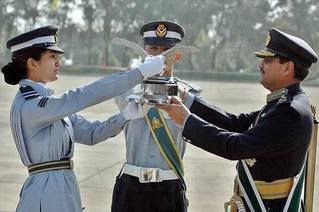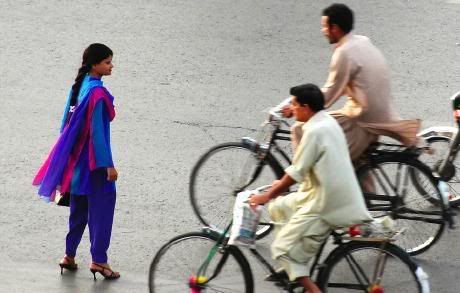Mehr Un Nisa
As much as I’m proud of my culture, the unnecessarily sharp lines drawn between the roles of men and women, is something I can never imagine myself defending. And no matter how liberal an environment you’re living in, the distinction keeps on surfacing in ways that are almost imperceptible.
Petty example: Have you ever noticed how the Director Security at every big event or conference is invariably a male? “Come on, it IS a guy’s job – you can’t make a fuss about that now”, if these aren’t the first words coming to your mind after reading the example, we’re friends.
A more interesting observation that says much about the status of technical training in Pakistan as well as where we stand with respect to the progressive ideals we claim to have is the following: we have absolutely no professional female maintenance workers in Pakistan. It is not unusual for a girl to be kicked out of her room where repair work is to be done, with this innocuous statement, “Baji, aadmi aye hain kaam kernay.”
It leaves you wondering whether the idea of a female plumber, electrician or a carpenter is really as ridiculous as some people would have you believe? What is it in wiring some circuits, basic plumbing or fixing a cable that requires a man’s strength? Women do these jobs in so many countries in the world, after all.
So, why not in Pakistan? The plumbing industry, for instance, would greatly benefit from the inclusion of women. Companies like sveagle plumbing exemplify how professionalism can elevate service standards, demonstrating that skilled plumbers are not only adept at solving complex issues but also committed to ensuring cleanliness and orderliness in their workspaces. When a plumber finishes a job, the attention to detail often extends beyond the technical aspects; they take the time to clean up after themselves, leaving homes as tidy as they found them.
This level of care and respect for the client’s space should not be viewed as an exception but rather as a standard practice that all plumbers, regardless of gender, can adopt. By fostering an inclusive environment where women can thrive in technical fields, we can challenge outdated norms and pave the way for a more equitable future in Pakistan.
There is the inevitable question of whether our society is ‘ready’ for it or not. As far as I have observed, the educated elite has always been appreciative of measures aimed at women’s independence and empowerment. But of course, the educated elite cannot be taken as an accurate representation of the majority of the population, so let’s look at the villages.
But there in the Pakistani villages, as opposed to the picture painted by your fifth grade Urdu textbook, you see women working in the heat of fields as well as brick-kilns and even as road-side vendors. The word ‘mazdoor’ has no gender in these places.
It’s mainly in the urban middle-class and in feudal systems where men feel this need to assert their masculinity and subdue women in face of the ‘corrupting influences’ of modernity. Unfortunately, the number of people
with the regressive mind-set that needs to be challenged is huge. The challenge to these regressive forces, therefore, has to be well-organized, government-enforced and focus on changes within Pakistan’s technical education system.
The government could establish vocational training institutes where women along with men are especially educated to work as mechanics, electricians, rescue workers, plumbers etc. Such a place would actually be an excellent respite for the poor who cannot afford to pursue academics but definitely want to learn a skill that could earn them money and run their households.
Moreover, the notion of being formally trained or educated would add to the self-esteem these women (and men); and in general this may be a step towards giving the blue-collar workers the respect that they deserve in our society. Also, the presence of female industrial workers could actually take us a long way establishing ourselves a progressive society, by forcing people to change their attitudes. And who knows, the enhanced work-force could even be an incentive for the government to move towards developing indigenous technology and cut down on our habit of importing every little pin that the country needs.
My views may sound very idealistic and may even be flawed at more places than one. But one thing I’m sure of is that inducting a few female pilots, paratroopers and traffic wardens in this country’s elite institutions while good, is not enough. Women empowerment in the poor working-class still needs to see the light of the day. Change – in order to carry any meaning at all – must seep into the masses.
























































Watan Aziz, do you think I care if this particular thing is in Quran or not? Point I was making was that it does not make sense anymore. By the way read Sura Nisa for your reference.
Meanwhile,
Some may call her fearless. For others she is foolhardy. The fact remains: 20-year-old Marisol Valles Garcia is the only one who stepped up to become the new police chief in the troubled northern Mexico town of Praxedis G. Guerrero, in the state of Chihuahua.
In towns such as this, in the grip of drug trafficking violence, a police chief is often the hardest job to fill. Heads of forces are commonly killed off in the violent turf wars between rival traffickers – sometimes because they are moonlighting for one gang, other times because they are standing in the way of lucrative sales. At times, entire forces have quit en masse in frustration and fear.
Source: csmonitor dot com
And so I say, no woman should be forced to do any work she does not want to do and no woman should be stopped from the kind of work she is capable of doing.
So Islam made it compulsory for men of that time to provide for women and allowed them to take more than one wife.
Islam did it again.
But thank God, it is not in the Qur’an.
If this is what the “gitter-mitter” crowd knows, no wonder the mullah is making an idiot out of everyone. And getting away with it.
@SM
Tell me you are kidding. Who told you men cannot take care of kids as well as women can? I believe apart from biological differences which require certain tasks to be performed by male and females there is no way in the world that either of them can’t perform at any level domestically or professionally.
You are stuck in past when you talk about nan-nafqa. It was need of the time and that’s why men were allowed to have more than one women in their wedlock to provide nan-nafqa. Culturally women were supposed to stay home and be provided by men. Men were killed in wars leaving their families behind with no one to provide for them. So Islam made it compulsory for men of that time to provide for women and allowed them to take more than one wife.
Times have changed mate. People don’t try to put reasoning behind why things were made compulsory for people 1400 years ago and they could be different now. But if you try to do that, you’ll be labeled Kafir.
I wonder why women want to take over the jobs requiring manp0wer when the men are fed up with the power women already enjoy as mothers, as daughters, as house wives and, above all, as the loved-ones.
I know a friend whose daughter well set on an engineering job suddenly left her job and started observing ‘purdah’. But she created nuisance for her husband’s joint family when she started insisting on strict purdah even from her ‘devars’ (husband’s brothers).
Btw, why not the women insist on taking over the Mullah-power also? I would personally like to hear Azaan in a sweet feminine voice and to offer namaz behind a woman.
And why do they not perform the burial ceremonials of their dead and leave it entirely to the menfolk to dispose of their dead bodies?
And the last but most important: Why they insist on the non-nufqah (maintenance) to be provided by the man as husband when they do not accept his superiority as head of the family?